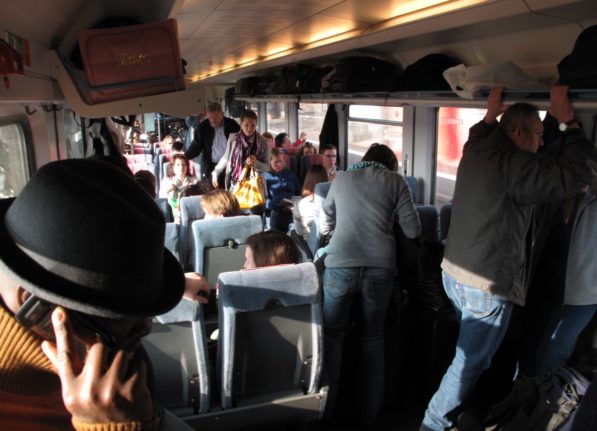Anyone who has travelled with Deutsche Bahn’s regional (RE) trains during the summer vacation period has probably seen how crowded German trains can get.
Last year, trains on some routes were completely overloaded.
Regional train passenger numbers have increased significantly since the introduction of the Deutschlandticket. According to the Association of German Transport Companies (VDV), the ticket, which costs €49 per month, has an average of 11.2 million users per month.
Deutsche Bahn wants to prevent overcrowded trains by adding more capacity in regional transport in summer, especially on routes that are in demand for tourism.
“We will provide more seats,” said Evelyn Palla, Deutsche Bahn board member and DB Regio CEO, to the German Press Agency. “Exactly what this will look like is currently being coordinated with the authorities.”
Which routes are the most crowded?
Regional trains heading for the Baltic Sea from Berlin, for example, sometimes had to pass stations with waiting passengers last summer because they were already too full.
“Especially in the case of excursion destinations, we are seeing a strong increase on weekends…,” said Palla.
She added that the routes; from Berlin to the Baltic Sea, from Hamburg to Sylt, or from Munich to Garmisch-Partenkirchen, are known to get exceptionally crowded.
Each of these routes connect summer travellers from big cities to popular regional vacation destinations.
The northern island of Sylt, for example, is known as a playground for affluent Germans. The North Frisian island became the subject of endless jokes when the Deutschlandticket was announced and German holidaymakers began to realize that with a €9 subscription ticket, people across the country could theoretically vacation there.
READ ALSO: What is Sylt and why is it terrified of Germany’s €9 holidaymakers?
Common vacation periods, like when public schools are out for summer break, and weekends also have an impact on train capacities, as well as the time of day.
The aforementioned routes tend to be more crowded in the outward direction during the morning and early afternoon, and then more crowded in the inbound direction in the evenings as people return home.
How can DB add more capacity?
It will be difficult to make adjustments in the short term, because the public authorities – the federal states and their transport associations – have authority over regional transport.
Palla said that DB is already communicating with the relevant parties. “We are in talks with them about how we want to proceed this summer,” she said.
Palla also emphasised that outside of key destination routes, regional transport is not overloaded in Germany. “We have an average capacity utilisation of 25 to 30 percent,” she said, which is half as much as in long-distance transport. “However, it can happen that we reach our limits on certain days of the week, on certain lines and routes.”
When it comes to adding passenger capacity on trains, the options are pretty straightforward, DB needs to add either more cars to its trains, or more trains on the routes that are crowded. But DB didn’t specify its exact plans.
Palla does not think, however, that the situation will be made worse by the upcoming Euro 2024 championship in Germany – a belief that will be tested in June.
However, Palla said that in addition to promoting the Deutschlandticket, politicians must also invest in the expansion of the offer because it is convincing people to choose public transport.
“At the end of the day, this is the lever that convinces people to use public transport,” she said.
READ ALSO: Where to expect disruption due to rail upgrades in Germany this year



 Please whitelist us to continue reading.
Please whitelist us to continue reading.
Member comments